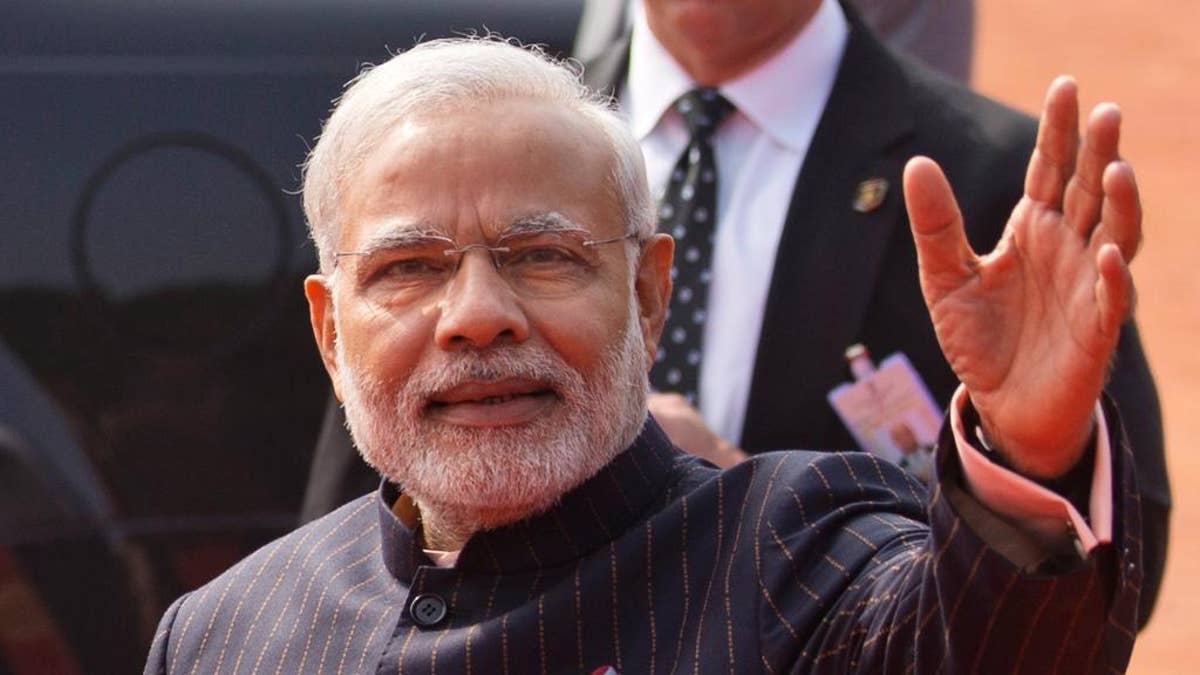
Jan. 25, 2015: Indian Prime Minister Narendra Modi waves during a reception for President Obama in New Delhi. (The Associated Press)
Indian Prime Minister Narendra Modi told Congress Wednesday that his nation and the U.S. have overcome "the hesitations of history" and called for ever-stronger economic and defense ties between the two countries.
"Let us work together to convert shared ideals into practical cooperation," Modi said in a speech that lauded both nations' common democratic principles and hailed two heroes of nonviolence, India's Mahatma Gandhi and civil rights leader Martin Luther King Jr.
"In advancing this relationship, both nations stand to gain in great measure," he said.
Modi's address followed years of being shunned in the U.S. because of religious violence in his home state. Underscoring the turnabout, it came a day after a White House meeting with President Barack Obama and preceded a lunch Modi will have in the Capitol with congressional leaders and a reception hosted by the House and Senate foreign affairs committees.
"Today, our relationship has overcome the hesitations of history," he said. "Comfort, candor and convergence define our conversations."
Modi drew laughter from the lawmakers crowding the House chamber for the joint meeting of Congress with a tongue-in-cheek description of the rough and tumble politics of the U.S.
"I am informed that the working of the U.S. Congress is harmonious. I am also told that you are well-known for your bipartisanship," he said. "Well, you are not alone."
When Modi evoked U.S.-India cooperation on climate change, Democrats rose in applause, but most Republicans stayed seated.
He also emphasized the common cultural ties between the two nations.
Modi cited estimates that "more Americans bend for yoga than to throw a curve ball." And he described the achievements of Indian-Americans, saying they are among the U.S.' best business executives, scientists, "even spelling bee champions."
When Modi applauded the sacrifices of soldiers from "the land of the free and the home of the brave" in the service of liberty, he clapped his hands above his head, prompting a standing ovation.
Modi said his nation's 1.25 billion people made India an "ideal partner" for U.S businesses. He said his goals include strengthening his country's rural economy, bringing electricity to all of the country's households and improving transportation systems, all achieved "with a light carbon footprint."
Citing the rising threat from the Islamic State and other extremist groups, he said, "We have both lost civilians and soldiers in combatting it. The need of the hour is for us to deepen our security cooperation."
At his meeting with Obama, the two leaders consolidated strong bilateral ties but fell short of major outcomes.
India, the world's third-largest carbon emitter among nations, said it would strive to formally join a global climate deal this year -- as the U.S. and China have said they will do -- but it gave no ironclad commitment.
There was also some progress on a landmark civilian nuclear agreement between the U.S. and India that was reached in 2008. The two governments said that U.S.-based Westinghouse Electric Co is preparing to build six nuclear reactors in India, but it has yet to finalize a contract.
Though the two countries' ties are growing stronger, there's also a sense in Congress that the relationship has yet to deliver on its promise and some lawmakers have criticized the Modi government's record on religious tolerance and combating human trafficking and slavery.
Modi is the fifth Indian leader to make a speech to Congress since 1985. The last was by his predecessor, Manmohan Singh, in 2005.
Coincidentally, it was that year that Modi was denied a visa to visit the U.S. over suspicions about his possible role in religious riots that killed more than 1,000 Muslims in the western state of Gujarat, where he was then the top official.
American officials largely avoided contact with Modi until he became prime minister in the 2014. Since then, he has visited the U.S. four times.
His tenure has seen an improvement in the bilateral relationship, particularly in defense. While India resists the notion of becoming a U.S. ally, the two militaries conduct more drills with each other than with any other nation. They share concern over China's rise and over freedom of navigation in the Asia-Pacific region.
Modi is also seen as a pro-business leader. There's been some easing of foreign investment restrictions, and trade has grown at a fair clip in recent years, but lawmakers have complained about continuing bureaucratic hurdles and investment limits and over the halting pace of liberalization in India.




